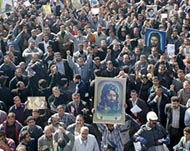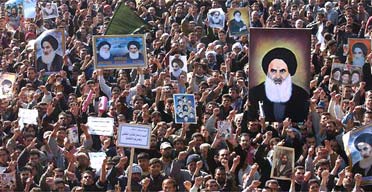From the Open-Publishing Calendar
From the Open-Publishing Newswire
Indybay Feature
Baghdad: 100,000 protest for open elections
About 100,000 protesters marched through Baghdad to al-Mustansiriyah University shouting "Yes to elections" and "No to occupation".
Shia protesters step up demand for Iraq elections
By Patrick Cockburn in Baghdad
20 January 2004
In their greatest show of political strength since the war tens of thousands of Iraqi Shia Muslims marched through Baghdad yesterday chanting slogans in favour of free elections for a new government.
About 100,000 protesters marched through Baghdad to al-Mustansiriyah University shouting "Yes to elections" and "No to occupation".
The Shia, believed to number some 15 to 16 million out of a total Iraqi population of 25 million, fear the US and its local allies will seek to rob them of power by appointing members of a new assembly and government to which the US has pledged to hand over power on 1 July.
The demonstration was clearly aimed at Kofi Annan, the secretary general of the UN, seeking to persuade him not to endorse US plans for indirect elections. Mr Annan met Paul Bremer, the chief US official in Iraq, and a delegation from the US-selected Iraq Governing Council in New York yesterday.
The UN is likely to be very wary of returning to Iraq after a suicide bomber killed 31 people and injured 120 - mostly Iraqi labourers - at the entrance to the US headquarters in Baghdad on Sunday.
Many of the demonstrators carried pictures of Grand Ayatollah Ali al-Sistani, the most influential Shia cleric, who has resolutely rejected the US plan for provincial caucuses to choose an assembly under an agreement signed on 15 November. It was he who called for the demonstration.
Amar Abdul Hassan, a student protester, said: "The Americans want to choose our leaders for us. We want to choose them ourselves through elections."
Giant banners billowed in the wind as the marchers, almost all men, chanted praise to Ali and Hussein, the martyred founders of the Shia faith. US observation helicopters flew overhead.
The US and the Governing Council say that a one-person, one-vote election cannot be organised in time. Demonstrators yesterday were dubious about this. Adnan Saddam, an engineer in the Ministry of Oil, said: "The real reason that Ahmad Chalabi and Iyad Allawi [former members of the exiled opposition] don't want elections is that they would not be elected."
Protesters were eager to claim that they were not sectarian and exclusively Shia. Akhil Oda, a student, said: "There is no reason for the Sunni to be frightened of us because it will be a democracy in which everybody will get his rights." But the Sunni know that it is the Shia who will have the majority at the polls.
Unlike Sunni areas of Iraq, many people at the demonstration expressed their opposition to armed resistance. Mahdi Abdul Salman said: "The resistance does not represent us and it harms the Iraqis because we are 90 per cent of the victims - that is what happened when the bomb went off [on Sunday]."
The demonstration marks another stage in the elevation of Ayatollah Sistani, the 73-year-old leader of the Hawza, or network of religious schools in Najaf, as perhaps the most important Iraqi leader. If he issues a fatwa denouncing the political process organised by the US and the Governing Council then it will have little legitimacy in the eyes of Iraqis.
The patience of Shia Muslims has been running out in recent months, not least because the economy has failed to improve as Iraqis had expected at the time of the fall of Saddam Hussein last April. In recent weeks there have been protests over unemployment in many Shia cities.
It will be difficult for Mr Bremer to ignore protests such as those yesterday demanding democratic elections.
The US and Britain justified the war last year by claiming that Saddam Hussein possessed weapons of mass destruction. Failure to find them has largely discredited WMD as a justification for war. This has made the overthrow of Saddam and the introduction of democracy to Iraq more important as a justification for the conflict.
It will be embarrassing for the US to hold elections denounced as undemocratic by Ayatollah Sistani and the largest Iraqi community.
By Patrick Cockburn in Baghdad
20 January 2004
In their greatest show of political strength since the war tens of thousands of Iraqi Shia Muslims marched through Baghdad yesterday chanting slogans in favour of free elections for a new government.
About 100,000 protesters marched through Baghdad to al-Mustansiriyah University shouting "Yes to elections" and "No to occupation".
The Shia, believed to number some 15 to 16 million out of a total Iraqi population of 25 million, fear the US and its local allies will seek to rob them of power by appointing members of a new assembly and government to which the US has pledged to hand over power on 1 July.
The demonstration was clearly aimed at Kofi Annan, the secretary general of the UN, seeking to persuade him not to endorse US plans for indirect elections. Mr Annan met Paul Bremer, the chief US official in Iraq, and a delegation from the US-selected Iraq Governing Council in New York yesterday.
The UN is likely to be very wary of returning to Iraq after a suicide bomber killed 31 people and injured 120 - mostly Iraqi labourers - at the entrance to the US headquarters in Baghdad on Sunday.
Many of the demonstrators carried pictures of Grand Ayatollah Ali al-Sistani, the most influential Shia cleric, who has resolutely rejected the US plan for provincial caucuses to choose an assembly under an agreement signed on 15 November. It was he who called for the demonstration.
Amar Abdul Hassan, a student protester, said: "The Americans want to choose our leaders for us. We want to choose them ourselves through elections."
Giant banners billowed in the wind as the marchers, almost all men, chanted praise to Ali and Hussein, the martyred founders of the Shia faith. US observation helicopters flew overhead.
The US and the Governing Council say that a one-person, one-vote election cannot be organised in time. Demonstrators yesterday were dubious about this. Adnan Saddam, an engineer in the Ministry of Oil, said: "The real reason that Ahmad Chalabi and Iyad Allawi [former members of the exiled opposition] don't want elections is that they would not be elected."
Protesters were eager to claim that they were not sectarian and exclusively Shia. Akhil Oda, a student, said: "There is no reason for the Sunni to be frightened of us because it will be a democracy in which everybody will get his rights." But the Sunni know that it is the Shia who will have the majority at the polls.
Unlike Sunni areas of Iraq, many people at the demonstration expressed their opposition to armed resistance. Mahdi Abdul Salman said: "The resistance does not represent us and it harms the Iraqis because we are 90 per cent of the victims - that is what happened when the bomb went off [on Sunday]."
The demonstration marks another stage in the elevation of Ayatollah Sistani, the 73-year-old leader of the Hawza, or network of religious schools in Najaf, as perhaps the most important Iraqi leader. If he issues a fatwa denouncing the political process organised by the US and the Governing Council then it will have little legitimacy in the eyes of Iraqis.
The patience of Shia Muslims has been running out in recent months, not least because the economy has failed to improve as Iraqis had expected at the time of the fall of Saddam Hussein last April. In recent weeks there have been protests over unemployment in many Shia cities.
It will be difficult for Mr Bremer to ignore protests such as those yesterday demanding democratic elections.
The US and Britain justified the war last year by claiming that Saddam Hussein possessed weapons of mass destruction. Failure to find them has largely discredited WMD as a justification for war. This has made the overthrow of Saddam and the introduction of democracy to Iraq more important as a justification for the conflict.
It will be embarrassing for the US to hold elections denounced as undemocratic by Ayatollah Sistani and the largest Iraqi community.
For more information:
http://news.independent.co.uk/world/middle...
Add Your Comments
We are 100% volunteer and depend on your participation to sustain our efforts!
Get Involved
If you'd like to help with maintaining or developing the website, contact us.
Publish
Publish your stories and upcoming events on Indybay.
Topics
More
Search Indybay's Archives
Advanced Search
►
▼
IMC Network




